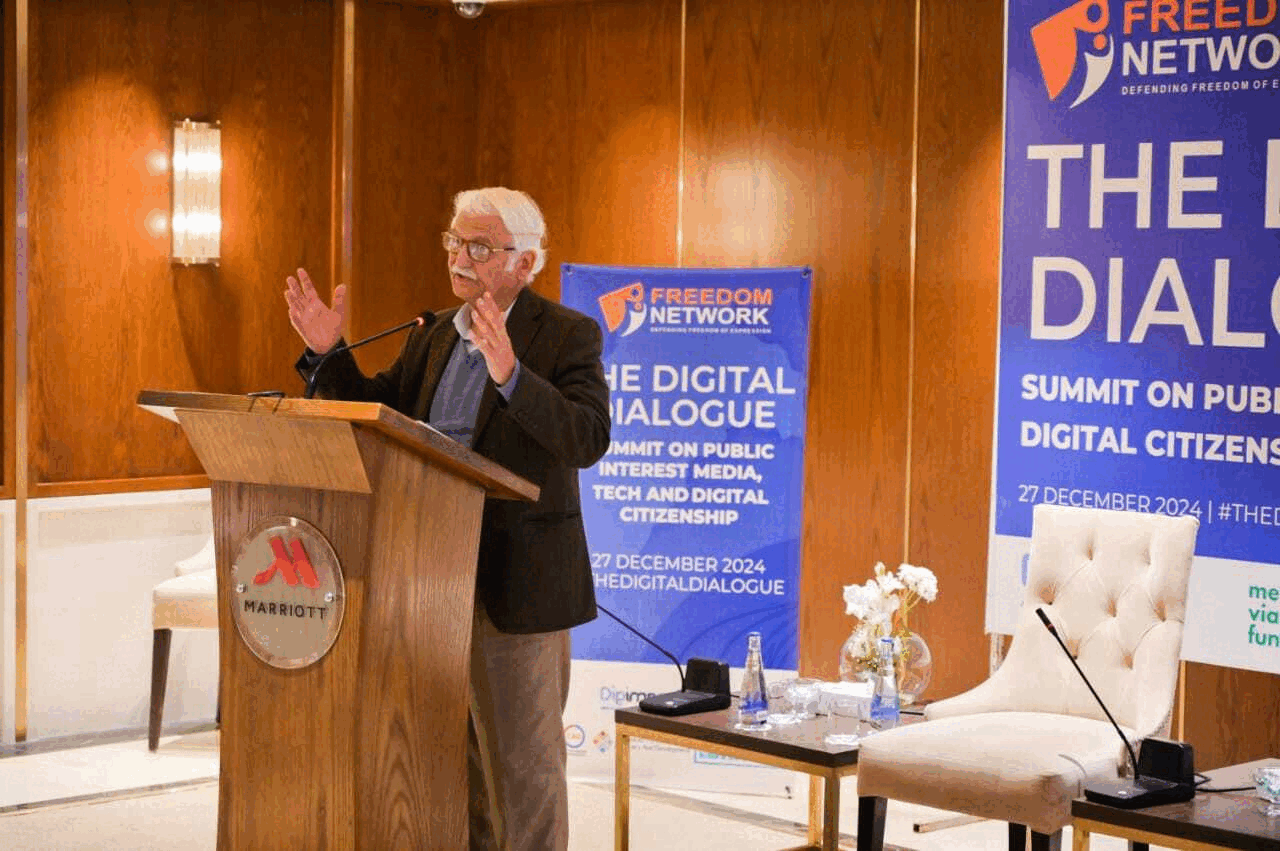Digital Media Sustainability Key to Future Journalism
News Desk
Islamabad: Access to digital spaces and uninterrupted Internet should be recognized as fundamental rights alongside citizens’ existing right to information, said human rights activist and former senator Farhatullah Babar.
Babar was speaking at The Digital Dialogue, organized by Freedom Network in Islamabad, which convened over 50 experts and practitioners from digital journalism, technology, academia, and civil society to discuss Pakistan’s digital future.
In his speech, Babar emphasized the need to advocate for a comprehensive legal framework on digital rights through engagement with parliamentary committees. “We must broaden the discussion on Internet governance and ensure inclusive dialogue,” he urged.
Iqbal Khattak, Executive Director of Freedom Network, highlighted the summit’s goal of fostering collaboration among stakeholders to address challenges in Pakistan’s digital media and tech sectors. “Equitable access and progressive policies are critical for preparing Pakistan for its digital future,” he stated.
Adnan Rehmat, author of the Pakistan Digital Transformation Report 2024, presented the findings. He noted Pakistan’s significant progress, ranking among the top 10 most digitalized societies globally in terms of Internet access and social media users.
“The country’s digital transformation is driving economic growth, fostering innovation, and improving governance,” Rehmat said. However, he also pointed out challenges such as inadequate infrastructure, limited investments, and a dichotomy in viewing Internet access as both a priority and a perceived threat to freedom of expression.

Achievements and Setbacks
The report identified positive advancements in digital policies, governance,, and space technology, while setbacks included challenges in digital freedom of expression, content regulation, privacy concerns, and insufficient investment in the digital economy.
The summit featured four panel discussions on digital media sustainability, online citizenship, tech sector collaboration, and public interest journalism.
Panelists emphasized the need for revenue diversification and consistent quality journalism. Talha Ahad, CEO of The Centrum Media, stressed the importance of maintaining credibility to attract audiences and revenue.
Media strategist Momina Mindeel suggested collaborations and audience engagement through offline events, while Arsalan Ali, CEO of Times of Karachi, highlighted the availability of investment opportunities for consistent digital news outlets.
Digital Citizenship
Digital rights activist Usama Khilji called for holding the government accountable for selective implementation of cyber laws. Usman Zafar, a digital expert, proposed incorporating digital critical thinking into education to help citizens navigate online information.
Journalist Qurrat ul Ain Shirazi urged local digital media to uphold ethical standards despite limited resources.
Discussions focused on balancing regulation with facilitation. Laraib Farhat from P@SHA highlighted the need for a consultative approach in digital policymaking.
Mutaher Khan, founder of Data Darbar, stressed the importance of scaling digital startups despite challenges like Internet slowdowns. Tech lawyer Mubariz Siddiqui pointed out intrusive compliance requirements deterring foreign investment.
Salwa Rana, IRADA’s program manager, criticized the policy-driven emphasis on control over fostering safe Internet access.
Public Interest Journalism
Ali Mujeeb of Ibex Media Network emphasized community-centric journalism in Gilgit-Baltistan, while Amber Rahim Shamsi, Pakistan Editor of Nukta, praised the rising quality of digital news. Nusrat Gandapur of Damaan TV highlighted the trust they built by addressing local issues in regional languages.
In her concluding remarks, Amber Rahim Shamsi urged digital media organizations to leverage AI tools while remaining cautious of the influence of Big Tech algorithms.
“The potential for digital media lies in its ability to amplify voices, foster accountability, and innovate for public good,” she said. The summit concluded with a call for collaboration and progressive policies to shape Pakistan’s digital future.

Comments are closed.